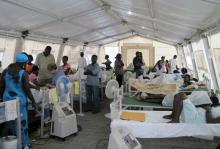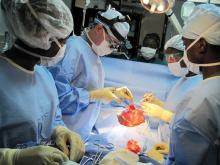PALM DESERT, CALIF. – Providing quality surgical care in resource-poor settings is challenging, but participants in the Paul Farmer Global Surgery Fellowship have found it to be a worthwhile endeavor.
The fellowship, founded by Dr. John Meara, plastic surgeon-in-chief at Children’s Hospital Boston, in conjunction with Dr. Paul Farmer of Partners in Health (PIH), was designed "to build surgical capacity internationally," according to Dr. Shahram Aarabi. Between June 2009 and June 2010, Dr. Aarabi served as a visiting surgeon in Haiti for 2 weeks every 2 months alongside Dr. Jason Smithers, a Paul Farmer Global Surgery Fellow with Children’s Hospital Boston.
"It’s also a model for how to help meet the global surgical burden in disease. The fellowship brings individual surgeons from abroad to work in specific PIH sites over the course of one or more years in order to provide continuity of care and teaching," Dr. Aarabi said at the annual meeting of the American Pediatric Surgical Association, where he reported on the work he did in Haiti.
Dr. Aarabi, a general surgery resident at the University of Washington, Seattle, spent most of his time in Cange, Haiti, at a 104-bed full-service hospital that includes four operating rooms. This facility was the first to be founded by PIH in 1985.
"The hospital and satellite clinics in the valley provide free care to patients over a catchment area of about 1.2 million people," he said, noting that there are now more than 11 PIH health care facilities nationwide. "There are two or three full-time Haitian general surgeons who work for PIH at these facilities, and one full-time orthopedic surgeon."
Dr. Aarabi also assisted in the temporary staffing of University Hospital in Port-au-Prince after the devastating earthquake of January 2010.
He reported on 147 operations that were performed on 131 patients at the two hospitals over a 12-week period. More than three-quarters (78%) of the procedures were elective, and 22% were emergent. Hernia repairs, imperforate anus/Hirschprung’s disease repairs, and bowel resections were the most commonly performed operations.
Nearly one-third of the operative patients (32%) were adults and the rest were children, including 15 under 1 year of age and five who were less than 2 months old. A minority of patients (29%) lived locally, while 71% came from various locations across the country, usually by foot.
"Some Haitians spent days to a week trying to get to PIH facilities for care," Dr. Aarabi said. "Our patients received regular follow-up at weekly clinics staffed either by ourselves or by Haitian general surgeons. Limits to follow-up were primarily due to social factors for our patients, not from a lack of surgical staffing."
Dr. Smithers, who is now a pediatric surgeon at Children’s Hospital Boston, said that he found it helpful to have an understanding of surgical history, because in many cases he and his associates relied on strategies used by surgeons 20 years ago, "when the equipment and capabilities that we had in the United States were similar to what Haiti currently has," he said.
For example, in the United States most Hirschprung’s disease repairs can be performed with a single surgical procedure in the neonatal period, while the same procedure in Haiti requires multiple stages.
"When it comes down to it, a lot of what surgeons need are just a scalpel and scissors, and some suture," Dr. Smithers added. "Even though we may have a variety of complex instruments at home, you can get by without those."
Dr. Aarabi said that most cases (91%) involved training of an American medical student or resident with an interest in international medicine, a Haitian resident, or a Haitian staff surgeon.
"We feel that one of the major strengths of the fellowship was that training of Haitian students and surgeons was integrated into the program. The infant cases in particular were valuable to the Haitian surgeons because there are no pediatric surgeons in Haiti," Dr. Aarabi said.
"Our nonoperative time was spent seeing patients in clinic, taking care of our inpatients, seeing new consults on the wards and in the emergency room, and working on site development and planning," he added.
The Paul Farmer Global Surgery Fellowship’s planned expansion to other sites around the world "holds promise as a way to provide a lasting collaboration of developing local surgical infrastructure and training local surgeons," he concluded.



